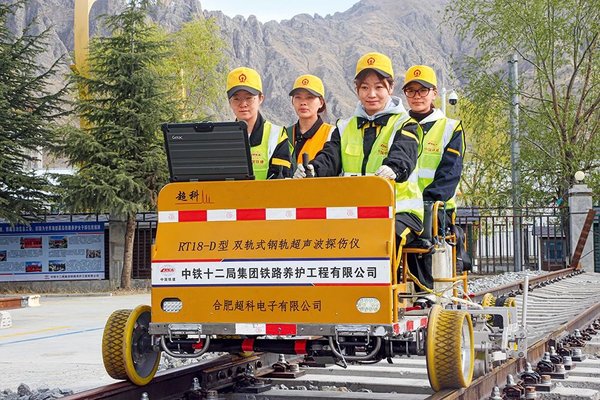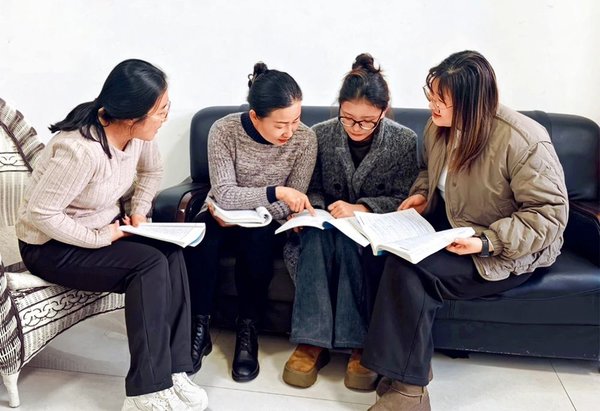
Upon arrival at Qinghai-Xizang Plateau, the world's highest-altitude plateau, one often experiences altitude sickness. Sometimes, even walking becomes a challenge. Yet, a group of young women walk along the Qinghai-Xizang Railway tracks, carrying heavy, flaw-detection equipment, as they meticulously inspect every inch of the tracks. They are members of the women's flaw-detection team, under China Railway 12th Bureau Group's Railway Maintenance Company.
The region's harsh natural environment, including the frozen earth and reduced level of oxygen, leaves the railway tracks vulnerable. Problems, such as cracking, formation of holes and tracks becoming loose, may occur. Therefore, it is necessary to look for flaws along the tracks.
Flaw detection, a technique used to identify internal defects in materials, is used in many fields, including manufacturing and the aerospace and railway industries. Flaw detection has generally been a profession dominated by men. In 2019, the China Railway 12th Bureau Group's Railway Maintenance Company broke with that tradition when it began to establish an all-women flaw-detection team to work on the Qinghai-Xizang Railway — the world's highest-altitude railway. More than 30 women employees applied to join the team. The women came from different job posts, with different work experiences, but they were united by their desire to demonstrate women's strength on the world's highest railway.

Today, the team is composed of 10 members — four ethnic Tibetans, five ethnic Hans, and one ethnic Tujia. The women range in age; for example, one member was born during the 1970s, while the youngest was born after 2000. The women's tasks are physically demanding, as the flaw-detection devices weigh around 70 pounds when loaded with water and couplant. Also, the team's members must carry the equipment for a long time as they examine the railway tracks.
"The equipment is heavy, but we are not fragile. Our job is to ensure maintenance of the Qinghai-Xizang Railway. We need to do our job well," says Tashi Wangmo, a Tibetan woman known for her tenacity. Another member, Liang Xiaoyi, adds, "We need to follow strict procedures in work. At first, I could only carry the equipment for a few hundred meters, then my arm would become sore. Now, I am more accustomed to it."
Liang, born during the 1990s, is from north China's Shanxi Province. She used to have a comfortable job in her hometown, but she always wanted to temper herself under difficult circumstances. In 2023, she found a job in Lhasa, capital of southwest China's Xizang Autonomous Region. A short time later, she applied to become a member of the flaw-detection team. Working outdoors, especially in a high-altitude area, is no easy task, and the team usually works during the evening hours. Liang had a difficult time overcoming altitude sickness, but she was optimistic and resilient. She often joked about her struggles. "It's not that hard, I just found it difficult to breathe during windy days," she has said. Her sense of humor and strong willpower have impressed her teammates, and helped the team's members keep their spirits high.

While the harsh environment tests their limits, the women leverage their unique strength. Their resilience, patience and attention to detail have enhanced their accuracy. Their amicable characters and communication skills have played important roles in their work coordination.
The women have overcome numerous difficulties, and they have improved their competence and performed exceedingly well. They share their experiences and encourage each other after work. Wang Xiaohua, from northwest China's Gansu Province, travels a lot for her work. Therefore, she has been unable to spend much time with her family. Her family has supported her by taking good care of her child, which has enabled Wang to have peace of mind while at work.
Tang Jing, initially overwhelmed by the environment and work pressure, created a rigorous study plan to improve her skills. Now, she is able to carry out operations on her own. Tang, a single mother, stuck to her post during this year's Spring Festival. Though she felt sorry for not being able to spend the holiday with her child, she says, "I will do my job well, both for my career pursuit, and for my child's support."

Kardzo, born after 2000, volunteered to receive extra training during weekends. Through relentless efforts, she has become more dependable and confident.
Fu Ling, the team's leader, has set an example in being committed to work. She has taken the lead in shouldering responsibility, and she has shared her work experiences with her teammates. After her shifts, she often has video chats with her daughter. "Seeing the railway remains in safe operation makes every effort worthwhile," Fu says, whenever she is asked if she feels tired.
Four women joined the team earlier this year, and they have since injected fresh vitality into the team. In March, the team was named a March 8th Red-Banner Collective of the China Railway Construction Corporation Limited, and also an outstanding women workers collective of the China Railway 12th Bureau Group Co., Ltd.
The women, hailed as "Gesang flowers" on the plateau, embody resilience and dedication. They have ensured the safe operation of the Qinghai-Xizang Railway, facilitated regional development, and promoted ethnic unity. Their story is one of sacrifice and unwavering commitment — a testament to the strength of women thriving on the roof of the world.
Photos from Interviewee
(Women of China English Monthly May 2025)
Editor: Wang Shasha